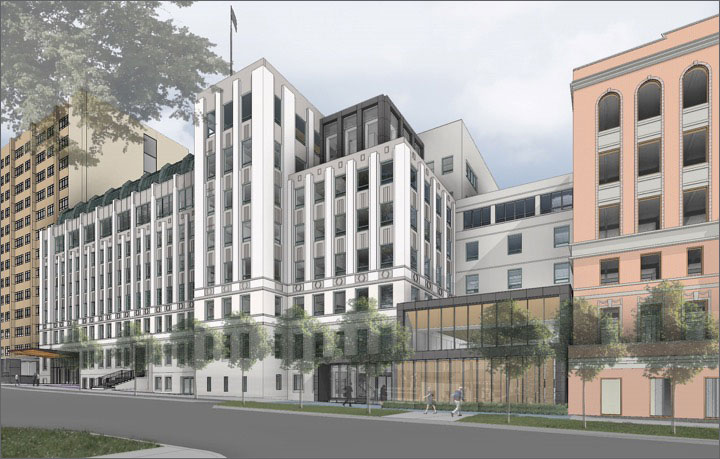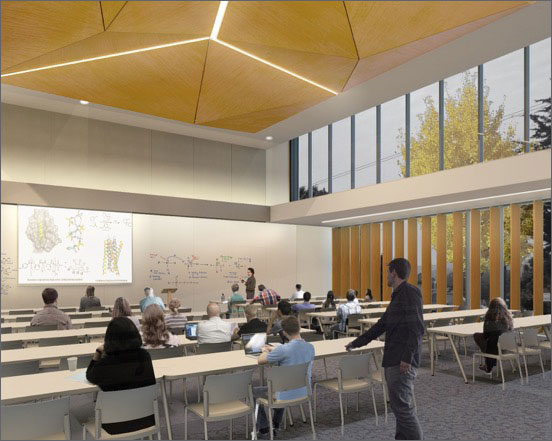Space Story Installment 1: Introduction
November 16, 2017
At UC San Francisco, space is limited as the campus seeks to grow and carry out its mission of “advancing health worldwide.” The UCSF Academic Senate is helping collaborate with other campus space entities to navigate these issues. The Senate’s role and other campus space issues will be covered in a quarterly, five-part written series on space located on the Senate website, so that faculty can stay up-to-date on any space-involved changes taking place on Parnassus, Mission Bay, Mount Zion, Laurel Heights, and Priscilla Chan and Mark Zuckerberg San Francisco General Hospital and Trauma Center (ZSFG).
This article is the first installment of the series. Future story installments may include highlights of: UCSF Center for Vision Neuroscience, Mission Hall, Joan and Sanford I. Weill Neurosciences Building, and UCSF at ZSFG Research and Academic Building. Academic Senate Communications Specialist, Kathryn Sill will be reporting on these stories in collaboration with contacts from the School of Medicine Dean’s Office, the UCSF Space website, and Real Estate, Planning, Capital Programs & Sustainability.
To help navigate space issues, the UCSF Academic Senate established Bylaw 185, which creates a standing Academic Senate Committee on Space (SPC). The bylaw passed with a 95.5% approval rating to go into effect on September 1, 2017. The Academic Senate SPC will serve as a liaison by representing faculty voice on space planning to the Administration and other UCSF space governance committees outside of the Senate, aiming to facilitate the setting of guidelines for campus space stewardship through recommendations, maintenance, and monitoring employee satisfaction.
The Academic Senate SPC will aid in space issues by reporting quarterly to the Senate’s Executive Council and once annually at the Senate’s Division Meeting. The Committee on Academic Planning and Budget (APB) will still maintain responsibility over fiscal space issues and Committee on Library and Scholarly Communication (COLASC) will retain responsibility over Library space issues. Members on the Academic Senate SPC will be faculty who already serve as Senate representatives on various UCSF space-related committees. This will allow the Senate to share information and develop a collective single response, when situations call for one.

(photo courtesy of EHDD Architecture and UCSF Capital Programs)
UCSF growth continues to outstrip the supply of space. Published in 2014, UCSF’s 20-year Long Range Development Plan (LRDP) projected a 30 percent increase in UCSF’s population and a 26 percent increase in space by 2035. Largely landlocked in a thriving and expensive real estate market, UCSF also faces certain hindrances from growing, including: limits on physical development, community and UCOP policy restrictions, and upkeep and ownership costs.
Recently, the Academic Senate spoke with Lori Yamauchi, Associate Vice Chancellor for Campus Planning in the Real Estate, Planning, Capital Programs & Sustainability (REPCAPS) department, who serves as an ex-officio member on APB and SPC. Yamauchi, who has been at UCSF for 27 years, is responsible for leading the physical, capital, and space planning at UCSF enterprise-wide, which means her unit advises on both academic buildings and medical center buildings.
“Through this whole process, we have sought to establish space governance policies that promote fairness, transparency, and accountability,” Yamauchi said.
Through policies, plans, projects, and analytics, Yamauchi advises on how to deal with space limitations, specifically city and community restrictions.
“My role includes leading the master planning, construction and real estate project planning, and housing and transportation planning at all of UCSF’s campus sites. Space isn’t an unlimited, free entity,” Yamauchi said. “Space we pay for must be utilized wisely.”

(photo courtesy of EHDD Architecture and UCSF Capital Programs)
One example of an area on campus that has been affected by changes to space is the Clinical Sciences Building (CSB). As one of the oldest buildings on the Parnassus campus, CSB is undergoing renovations to meet seismic safety requirements, with expected completion in late 2019. CSB will be changing to desktop space in an open plan design. The Open Plan Design for CSB adapted the Activity-Based Workplace (ABW) model into a “hybrid” design, which includes a variety of work spaces for focused and communal work, including: assigned private offices, assigned work stations, unassigned focus rooms, hotel work stations, and open areas. It also includes shared meeting and social spaces, such as huddle rooms, conference rooms, and town centers (kitchen, seating for informal gathering).
In order to help with this adjustment, a faculty-led CSB and UC Hall Advisory Committee, with Academic Senate representatives, developed recommendations on criteria for determining the programs which should populate CSB and how private offices in CSB should be allocated. This work is based on a workplace research study commissioned to assess the faculty and staff well-being and work efficiency experienced in the ABW model first used on campus in Mission Hall. The proposed CSB design is available online. CSB is one example of the Senate practicing shared governance.
To stay updated on future Senate space stories, visit the Senate website and to find more information on UCSF space renovations, visit the UCSF Space Website, which is separate from the Senate.
Created by UC Board of Regents Standing Order 105, the UC San Francisco (UCSF) Academic Senate is empowered to exercise direct control over such academic matters as admissions for degrees and curricula, which are of central importance to the University. The UCSF Division of Academic Senate provides an independent forum to discuss faculty-related campus wide academic concerns. In other areas, the Senate exercises an active advisory role. The Academic Senate works within the larger body of UCSF, a leading university dedicated to promoting health worldwide through advanced biomedical research, graduate-level education in the life sciences and health professions, and excellence in patient care.
